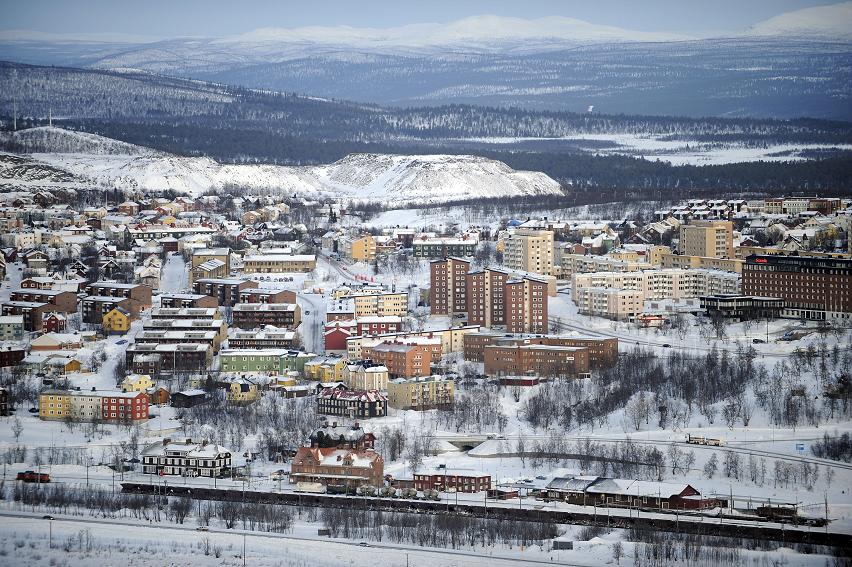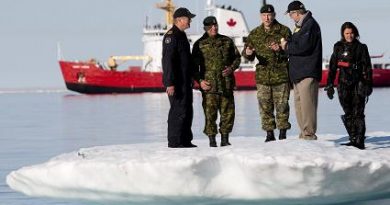The Arctic Council Ministerial: Nothing/Everything Has Changed

(Olivier Morin, AFP)
On the face of it, the Arctic Council Ministerial that took place on May 15 was largely business as usual. The biggest story of course was the acceptance of five Asian states (Japan, India, China, South Korea and Singapore) as Observers into the Council, and the delay, but not denial, of the European Union, pending a resolution with Canada over its seal product ban. It seems as though there was some eleventh hour politicking, and the outcomes were not foregone conclusions. But it must be conceded that the real story here was that the EU and major Asian nations wanted to be admitted as observers to the Arctic Council in the first place – and that is a story that began in 2006. The 2013 Ministerial will get history’s footnote, but it represents the culmination of a trajectory that has seen international interest in the Arctic grow for several years.
The other major deliverable of the Ministerial was the signing of an agreement on oil pollution, preparedness and response. Being only the second legal instrument to come out of the Arctic Council, it is significant – but it was telegraphed two years ago at the Nuuk Ministerial, and leaked several months ago in its entirety, so that the effect was somewhat anti-climactic.
Amongst the SAO and working group documents, the Vision for the Arctic is too vague to be useful. But it is a credit to the Arctic Council that the numerous, high quality scientific reports – including an Arctic Biodiversity Assessment, Arctic Ocean Acidification assessment, Arctic Ocean Review report, report on Ecosystem Based Management, and reports from the Adaptation Actions for a Changing Arctic initiative – were practically ignored. High quality scientific reports are the bread and butter of the Arctic Council, and the embarrassment of riches presented at the 2013 Ministerial have become treated as commonplace.
At a Crossroads, Again
Six months ago, this is exactly what I would have hoped for and expected. The Arctic Council has come of age. It is productive and collegial. It focuses appropriately on common environmental security challenges, and it is making good progress on addressing these. Good governance is boring, and the best thing that could happen to the Arctic Council is if it made incremental progress on implementing and enforcing environmental regulations through the domestic bureaucracies of its members until it fades from the global spotlight.
It was the reaction to the Ministerial, and specifically to Leona Aglukkaq and her Canadian Chairmanship program, that changed my thinking. Who would have thought that a theme entitled “Development for the People of the North” would be so controversial? But it has sparked significant criticism. As one commentator put it, “To call the Canadian vision unfashionable… would be an understatement.” Others highlighted the difference in Canada’s “proprietary” focus, to other visions, such as the USA’s and China’s, which see the region as a global commons. It seems focusing on “development”, or “people”, or “the North” are all potentially problematic for those who see the Arctic region, above all, as a vulnerable, and globally integral, ecosystem that urgently needs protection.
Undeterred, Aglukkaq aims to use her helm at the Chair to advance a “ ‘people first’ agenda focused on expanding economic opportunities and creating jobs in Canada’s North and throughout the circumpolar world.” And this poses a much bigger question about what the Arctic Council is for, and what it should do.
When it was established in 1996, the Arctic Council was given a twin mandate of environmental protection and sustainable development. There is no question that it has focused, almost exclusively, on the former. So here and now, the Arctic Council finds itself unexpectedly at another crossroads, having just made the significant jump from a decision-shaping to a decision-making body. Is the Arctic Council a global forum that focuses on environmental issues? Or is it a regional forum that focuses on human development issues? Does Canada have the legitimacy to transform the Arctic Council from an environment- to people-centred forum in two short years? And does the Arctic Council have the capacity to enact development in the region, even if Canada succeeds in instilling the will?
Time For A People-Centred Chairmanship
The question is not if the Arctic Council should occupy itself with scientific and environmental matters, but if it can also concern itself with the economic well-being of the people who live in the region. This is an issue which Aglukkaq can rightly point out has been excluded, if not in words then in actions, from the good work of the Arctic Council. Politically, this is a very difficult task; economic development is often seen as an enemy to environmental protection. But from my perspective, it is an essential one. In general, the Arctic can be considered a model international region. But when it comes to the debate on Arctic development, I long to crawl on a plane to a normal place, like Africa, where poverty reduction and economic development are considered good things. If northern communities want jobs and economic self-sufficiency, they should have the same opportunity as everyone else on the planet to achieve it.
Canada has been accused of promoting a very 20th century vision for its two-year Chairmanship of the Arctic Council, in contrast to the cosmopolitan and progressive efforts of Sweden to transform the Arctic into a global space. But it is the 19th century that Aglukkaq is trying to avoid. Northerners cannot miss a second opportunity to benefit from rapid economic development in the region. The Arctic Council needs to be at the forefront of supporting this.


